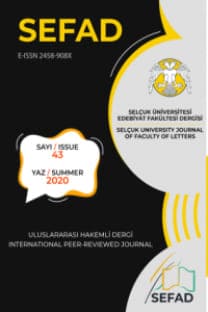AVRUPA'DA OKUL MÜDÜRLERİNİN HAZIRLANMASI
Okul müdürleri, okullar, İngiltere, Kıbrıs, İsveç, Yunanistan
___
- ACKERMAN, RH. (1998),_“A Conversation On The Rocks", in Van Der Hogarth
- R. (ECL), Making Learning Communities Work: The Critical Role of the Leader as Learner, Jossey-Bass, San Francisco, CA. BRUNDRETT, M. (1999), “The Range Of Provision Of Taught Higher Degrees ln
- Educational Management in England And Wales”, International Studies in Educational Administration, Vol. 27 No. 2. pp. 43—59. BRUNDRETT, M. (2001), “The Development Oi School Leadership Preparation
- Programmes ln England And The USA: A Comparative Analysis”, Educational Management and Administration, Vol. 29 No. 2, pp. 229-46. BUDGE, D. (1999), “There’s No Euro For School İnspectors", Times Educational Supplement, Issue 4316, p. 22.
- BUSH, T. (1998), “The National Professional Qualification For Headship: The Key To Effective School Leadership?”, School Leadership and Management, Vol. 18 No. 3, pp. 321-33. '
- COHEN, I, MANİON, L. and MORRISON, K. (2000), Research Methods in
- Education, RoutledgeFalmer, London, New York, NY. - DİMMOCK, C. and WALKER, A. (1998), “Comparative Educational
- Administration: Developing A Cross-Cultural Conceptual Framework”, Educational Administration Quarterly, Vol. 30 No. 4, pp. 558-95. DOOLİTTLE, G. and BARNETT, B. (Eds) (2003), “Innovative Practices ln
- Educational Leadership Preparation: What Are We Doing And How Are We influencing Students And Schools?", Journal of School Leadership, Vol. No. 6 (special issue). DRAKE, P., PAlR, C., ROSS, K., POSTLETHWAlTE, T. and ZlOGAS, G. (1997),
- Appraisal Study on the Cyprus Educational System, International institute for Educational Planning, Paris. GREEN, H. (1998), “Training For Today’s School Leaders", Education Journal, Vol. 21, p. 11.
- GRONN, P. (1999), The Making of Educational Leaders, Cassell, London.
- GÜNTER, H. and RİBBİNS, P. (2002), “Leadership studies in education: towards a map of the field”ı Educational Management and Administration, Vol. 30 No. 4, pp. 387-416.
- HElMER, J. (1998), “Rektorsutbildningens Historia Och Morgondagens Krav in”, in Johansson, 0. and Lindberg, L. (Eds), Hektor en spraD ngbra" da fo"r utueclcling?, Centrum fo"r skolledarutveckling, Umea" universitet, Umea“, s. 126.
- KREUGER, RA. (1998), Analyzing and Reporting Focus Group Results, Vols 1—6,
- Sage, Thousand Oaks, CA. LAFOND, A. (1995), “The European Dimension Of Educational Management As
- Seen Through_Netwprking”, European Journal of Education, Vol. 30 lilo. .î p. 317. ' ' LAİNAS, A. (2000), “Management And Work Planning Of Schools: Scientific
- Perspectives And Grek Reality”, In Papanaoum, Z. (Ed.), The Planning of Teaching Work in the School, Thessaloniki (in Greek), pp. 23-40. MAVROSKOUFİS, D. (1992), "Aspects ln The issue Of Evaluation, The Selection
- And The Role Of Principals ln Secondary Education”, Contemporary Education, Vol. 64, pp. 24-36. MORGAN, DL. (1988), Focus Groups as Qualitative Research, Sage, Beverly Hills, CA. .
- NYGREN, A. and JOHANSSON, O. (2000), “Den Svenske Rektorn Efter 1945 —
- Kvalifikationer, Arbetsuppgifter Och Utmaningar", in Moos, L., Carney, S., Johansson, 0. And Mehlbye, J. (Eds), Skoleiedelse i Norden - En Kortlaegning At Skoleledernes Arbejdsviika0 R, Rammebetingelser 0g Opgaver, En Rapport Til Nordisk MinisterraÜd, Nord 2000zl4, Ko'penhamn.
- PAPANAOUM, Z. (1995), School Management: Theoretical Analysis and Empirical Research, Kiriakidis, Thessaloniki (in Greek).
- PASHlARDlS, P. (1995), “Cyprus Principals And The Universalities Of Effective
- Leadership", International Studies in Educational Administration, Vol. 23 No. 1, pp. 16-27. Angela THODY— Zol PAPANAOUM - Olof JOHANSSON — Petros PASHIARDlS PASHİARDİS, _P. (1997), “Towards Effectiveness: What Do Secondary School
- Leaders In Cyprus Need?”, Journal of ln-seruice Education, Vol. 23 No. 2, pp. 267-82. PASHİARDİS, P. and ORPHANOU, s. (1999), “An insight lnto Elementary
- Principalship İn Cyprus”, The International Journal of Educational Management, Vol. 13 No. 5, pp. 241—51. PASI-llARDlS. P. and RlBBlNS, P. (2000), “On Cyprua: The Making or Secondary School Principals", Paper Presented At The Conference Of
- ACEA, CCEAM, NZEAS, PNGEA, TSPA on Education: The Global Challenge, Hobart. RİCHMON, M. and ALLİSON, D. (2003), “Towards A Conceptual Framework
- For Leadership Enquiry”, Educational Management and Administration, Vol. 31 No. 1. SAİTİS, Ch. (1997), “The Reform Of Educational Management İn Greek
- Education, 1976—1996", New Education, Vol. 81, pp. 109-20.
- SAiTis. Ch. and GOUNAROPOULOS, G. (2001), “The Necessity or Planning
- For The Creation Of Administrative Staff In Education”, New Education, Vol. 99, pp. 75-89 (in Greek). SAİTİS, Ch., TSİAMASSİ, F. and CHATZİ, M. (1997), “The School Director:
- Manager—Leader Or Traditional Bureaucrat?", New Education, Vol. 83, pp- 77 (in Greek) _ _ _ _ SCl—ION, D.A. (1987), Educating the Reflective Practitioner: Towards a New
- Design for Teaching and Learning in the Professions, Jossey-Bass, London. THODY, AM. (1998), “Training School Principals, Educating School Governors”.
- International Journal of Education Management, Vol- 12 No. 5, pp. 232-9. TOMLlNSON, H., GÜNTER, H. and SMlTH, P. (1999), Living Headship: Voices,
- Values and Vision, Paul Chapman, London. TTA (1997), National Standards for Principals, TTA, London.
- TTA (1998), TTA National Leadership Programme for Serving Headteachers, 'ITA, London.
- Van den BRANDEN, J. and LAMBERT, J. (1999), “Cultural issues Related To
- Transnational Open Anddistance Learning ln Universities: A European Problem?", British Journal of Educational Technology, Vol. 30 No. 3, p- Further reading WOLTRİNG, C., CONSTANTlNE,W. and SCHWARTE, L. (2003), “Does
- Leadership Training Make A Difference?”, Public Health Management in Practice, Vol. 9, CDu/UC Public Health Leadership Institute, University of California, Los Angeles, CA..
- Yayın Aralığı: 2
- Başlangıç: 1981
- Yayıncı: Selçuk Üniversitesi Edebiyat Fakültesi
FETİHNAME-İ KIBRIS'IN MÜELLİFİ OLAN "ŞERÎFÎ" KİMDİR?
ÜÇ ROMAN ÇERÇEVESİNDE YAZMA ZAMANI YABAN-KÜÇÜK AĞA-YORGUN SAVAŞÇI
AÇIKLAMALI YENİ KELİMELER SÖZLÜĞÜ
ŞER'İYE SİCİLLERİNDE BULUNAN KONYA VAKFİYELERİ (1650-1800)
FETİHNAME-İ KIBRIS'IN MÜELLİFİ OLAN "ŞERÎFÎ" KİMDİR?
ERMENİSTAN'IN KARABAĞ'I İŞGAL SÜRECİ VE SONRASINDA AZERBAYCAN'DA YAŞANAN ZORUNLU GÖÇLER VE SORUNLARI
BAZI XVI. YÜZYIL DİVANLARINDA KIYMETLİ TAŞLAR
AHMED-İ DÂÎ’NİN BİLİNMEYEN BİR ESERİ: İLM-İ ARÛZ
TÜRKİYE'DE YAŞANAN SOSYAL OLAYLAR VE TÜRK SİNEMASINA YANSIMALARI (1980-2004)
